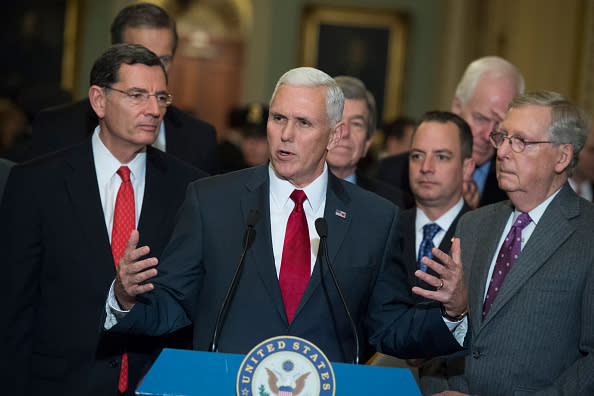Lawmakers just made it nearly impossible for consumers to sue financial companies like Equifax

Senate Republicans voted in Tuesday to kill rules that would have allowed Americans harmed by financial companies, including scandal-plagued Equifax and Wells Fargo, to sue.
In a vote so narrow Vice President Mike Pence was required to break what had been 50-to-50 deadlock, the Senate moved to repeal the new Consumer Financial Protection Bureau’s arbitration rule. The rule—announced in early July and slated to apply to contracts signed after March 2018—prohibited major financial institutions from using fine print in buried in consumer contracts to block class-action lawsuits by consumers.
The rule was killed using the existing Congressional Rule Act, under which Congress can block new regulatory measures. Since the House of Representatives previously voted in July to repeal the rule, Tuesday’s Senate vote propels the legislation to President Trump’s desk, and he is expected to sign the bill shortly.
Related article: What everyone needs to know about the heated battle to take away your right to sue big companies
Tuesday’s vote was a huge blow for the CFPB, an agency that has spent years studying and formulating rules.
“Wall Street won and ordinary people lost,” Richard Cordray, the director of the consumer bureau, said in a statement.
“It robs consumers of their most effective legal tool against corporate wrongdoing. As a result, companies like Wells Fargo and Equifax remain free to break the law without fear of legal blowback from their customers.”
Arbitration clauses are commonplace in the financial industry: About three-fourths of banks analyzed by Pew Charitable Trusts, for instance, had mandatory arbitration agreements in place. The clauses mean customers have no recourse but to bring any disputes to private, arbitration panels. In general, that keeps many of the details shrouded in secrecy, as in the case of the Wells Fargo account fraud scandal, according to consumer advocates. Additionally, the arbitration process itself is often stacked against consumers, consumer advocates say.
Breaking: @SenateGOP to vote tomorrow to take away your legal rights against companies like @Equifax & @WellsFargo. Here's what's at stake. pic.twitter.com/fL8NBRmgDD
— Elizabeth Warren (@SenWarren) October 23, 2017
Related article: CFPB just issued a new rule that would protect consumers from predatory fine print
The financial industry lobbied hard against the CFPB’s rule, arguing it added unnecessary regulations and that arbitration can benefit consumers because it can be faster and less expensive than going to court.
“Overturning the CFPB’s arbitration rule ensures consumers retain the tools they need to receive relief without going through long, drawn-out, costly court proceedings – where no one benefits except trial lawyers,” Richard Hunt, President and CEO of the Consumer Bankers Association said in a statement.
Contrary to claims made by the rule’s opponents, the CFPB’s rule would not have banned financial institutions—a group that includes banks, credit card companies, student lenders, payday lenders, debt collectors, and credit reporting companies—from using arbitration to settle disputes. But unlike the current system, consumers would have the option to voluntarily agree to the forum after the dispute arose.
Consumer groups spent months fighting the financial industry’s attempts to kill the rule, putting together research supporting the rule and placing targeted ads in key states. In fact, two groups Public Citizen and Americans for Financial Reform sent the Monopoly Man to deliver bags of money to U.S. Sen. Tom Cotton’s (R-Ark.), a co-sponsor of the Senate repeal legislation.
“This vote marks a truly shameful moment in Congress,” Amanda Werner, who plays the Monopoly Man, said in a statement. “Just weeks after holding hearings on scandals of historic proportion, the Senate granted Equifax and Wells Fargo a Get Out of Jail Free card. Rather than pass meaningful legislation to help the 145 million Americans harmed by the data breach, a slim Republican majority chose to take away our only chance at holding financial giants accountable.”
This article originally appeared in Time.com
